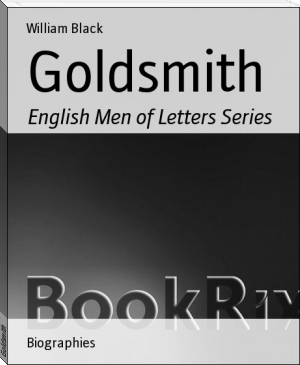Goldsmith, William Black [fiction book recommendations txt] 📗

- Author: William Black
Book online «Goldsmith, William Black [fiction book recommendations txt] 📗». Author William Black
"_Lofty._ Waller? Waller? Is he of the house?
_Mrs. Croaker._ The modern poet of that name, sir.
_Lof._ Oh, a modern! We men of business despise the moderns;
and as for the ancients, we have no time to read them.
Poetry is a pretty thing enough for our wives and daughters;
but not for us. Why now, here I stand that know nothing of
books. I say, madam, I know nothing of books; and yet, I
believe, upon a land-carriage fishery, a stamp act, or a
jag-hire, I can talk my two hours without feeling the want
of them.
_Mrs. Cro._ The world is no stranger to Mr. Lofty's eminence
in every capacity.
_Lof._ I vow to gad, madam, you make me blush. I'm nothing,
nothing, nothing in the world; a mere obscure gentleman. To
be sure, indeed, one or two of the present ministers are
pleased to represent me as a formidable man. I know they are
pleased to bespatter me at all their little dirty levees.
Yet, upon my soul, I wonder what they see in me to treat me
so! Measures, not men, have always been my mark; and I vow,
by all that's honourable, my resentment has never done the
men, as mere men, any manner of harm--that is, as mere men.
_Mrs. Cro._ What importance, and yet what modesty!
_Lof._ Oh, if you talk of modesty, madam, there, I own, I'm
accessible to praise: modesty is my foible: it was so the
Duke of Brentford used to say of me. 'I love Jack Lofty,' he
used to say: 'no man has a finer knowledge of things; quite
a man of information; and when he speaks upon his legs, by
the Lord he's prodigious, he scouts them; and yet all men
have their faults; too much modesty is his,' says his grace.
_Mrs. Cro._ And yet, I dare say, you don't want assurance
when you come to solicit for your friends.
_Lof._ Oh, there indeed I'm in bronze. Apropos! I have just
been mentioning Miss Richland's case to a certain personage;
we must name no names. When I ask, I am not to be put off,
madam. No, no, I take my friend by the button. A fine girl,
sir; great justice in her case. A friend of mine--borough
interest--business must be done, Mr. Secretary.--I say, Mr.
Secretary, her business must be done, sir. That's my way,
madam.
_Mrs. Cro._ Bless me! you said all this to the Secretary of
State, did you?
_Lof._ I did not say the Secretary, did I? Well, curse it,
since you have found me out, I will not deny it. It was to
the Secretary."
Strangely enough, what may now seem to some of us the very best scene in the _Good-natured Man_--the scene, that is, in which young Honeywood, suddenly finding Miss Richland without, is compelled to dress up the two bailiffs in possession of his house and introduce them to her as gentlemen friends--was very nearly damning the play on the first night of its production. The pit was of opinion that it was "low;" and subsequently the critics took up the cry, and professed themselves to be so deeply shocked by the vulgar humours of the bailiffs that Goldsmith had to cut them out. But on the opening night the anxious author, who had been rendered nearly distracted by the cries and hisses produced by this scene, was somewhat reassured when the audience began to laugh again over the tribulations of Mr. Croaker. To the actor who played the part he expressed his warm gratitude when the piece was over; assuring him that he had exceeded his own conception of the character, and that "the fine comic richness of his colouring made it almost appear as new to him as to any other person in the house."
The new play had been on the whole favourably received; and, when Goldsmith went along afterwards to the Club, his companions were doubtless not at all surprised to find him in good spirits. He was even merrier than usual; and consented to sing his favourite ballad about the Old Woman tossed in a Blanket. But those hisses and cries were still rankling in his memory; and he himself subsequently confessed that he was "suffering horrid tortures." Nay, when the other members of the Club had gone, leaving him and Johnson together, he "burst out a-crying, and even swore by ---- that he would never write again." When Goldsmith told this story in after-days, Johnson was naturally astonished; perhaps--himself not suffering much from an excessive sensitiveness--he may have attributed that little burst of hysterical emotion to the excitement of the evening increased by a glass or two of punch, and determined therefore never to mention it. "All which, Doctor," he said, "I thought had been a secret between you and me; and I am sure I would not have said anything about it for the world." Indeed there was little to cry over, either in the first reception of the piece or in its subsequent fate. With the offending bailiffs cut out, the comedy would seem to have been very fairly successful. The proceeds of three of the evenings were Goldsmith's payment; and in this manner he received L400. Then Griffin published the play; and from this source Goldsmith received an additional L100; so that altogether he was very well paid for his work. Moreover he had appealed against the judgment of the pit and the dramatic critics, by printing in the published edition the bailiff scene which had been removed from the stage; and the _Monthly Review_ was so extremely kind as to say that "the bailiff and his blackguard follower appeared intolerable on the stage, yet we are not disgusted with them in the perusal." Perhaps we have grown less scrupulous since then; but at all events it would be difficult for anybody nowadays to find anything but good-natured fun in that famous scene. There is an occasional "damn," it is true; but then English officers have always been permitted that little playfulness, and these two gentlemen were supposed to "serve in the Fleet;" while if they had been particularly refined in their speech and manner, how could the author have aroused Miss Richland's suspicions? It is possible that the two actors who played the bailiff and his follower may have introduced some vulgar "gag" into their parts; but there is no warranty for anything of the kind in the play as we now read it.
CHAPTER XIII.
GOLDSMITH IN SOCIETY.
The appearance of the _Good-natured Man_ ushered in a halcyon period in Goldsmith's life. The _Traveller_ and the _Vicar_ had gained for him only reputation: this new comedy put L500 in his pocket. Of course that was too big a sum for Goldsmith to have about him long. Four-fifths of it he immediately expended on the purchase and decoration of a set of chambers in Brick Court, Middle Temple; with the remainder he appears to have begun a series of entertainments in this new abode, which were perhaps more remarkable for their mirth than their decorum. There was no sort of frolic in which Goldsmith would not indulge for the amusement of his guests; he would sing them songs; he would throw his wig to the ceiling; he would dance a minuet. And then they had cards, forfeits, blind-man's-buff, until Mr. Blackstone, then engaged on his _Commentaries_ in the rooms below, was driven nearly mad by the uproar. These parties would seem to have been of a most nondescript character--chance gatherings of any obscure authors or actors whom he happened to meet; but from time to time there were more formal entertainments, at which Johnson, Percy, and similar distinguished persons were present. Moreover, Dr. Goldsmith himself was much asked out to dinner too; and so, not content with the "Tyrian bloom, satin grain and garter, blue-silk breeches," which Mr. Filby had provided for the evening of the production of the comedy, he now had another suit "lined with silk, and gold buttons," that he might appear in proper guise. Then he had his airs of consequence too. This was his answer to an invitation from Kelly, who was his rival of the hour: "I would with pleasure accept your kind invitation, but to tell you the truth, my dear boy, my _Traveller_ has found me a home in so many places, that I am engaged, I believe, three days. Let me see. To-day I dine with Edmund Burke, to-morrow with Dr. Nugent, and the next day with Topham Beauclerc; but I'll tell you what I'll do for you, I'll dine with you on Saturday." Kelly told this story as against Goldsmith; but surely there is not so much ostentation in the reply. Directly after _Tristram Shandy_ was published, Sterne found himself fourteen deep in dinner engagements: why should not the author of the _Traveller_ and the _Vicar_ and the _Good-natured Man_ have his engagements also? And perhaps it was but right that Mr. Kelly, who was after all only a critic and scribbler, though he had written a play which was for the moment enjoying an undeserved popularity, should be given to understand that Dr. Goldsmith was not to be asked to a hole-and-corner chop at a moment's notice. To-day he dines with Mr. Burke; to-morrow with Dr. Nugent; the day after with Mr. Beauclerc. If you wish to have the honour of his company, you may choose a day after that; and then, with his new wig, with his coat of Tyrian bloom and blue silk breeches, with a smart sword at his side, his gold-headed cane in his hand, and his hat under his elbow, he will present himself in due course. Dr. Goldsmith is announced, and makes his grave





Comments (0)